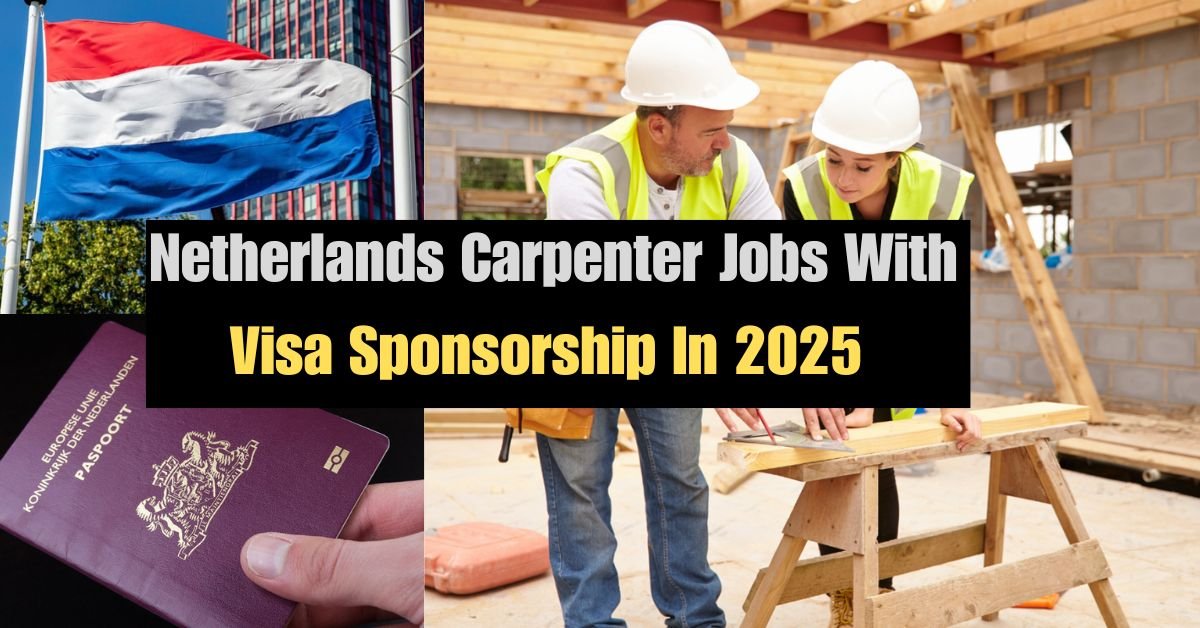Carpenter Jobs In The Netherlands With Visa Sponsorship
Are you a expert carpenter with a passionless for your trade and a feeling for a new task? Imagine on the job on advanced construction undertaking in the Netherlands, a country best-known for its stunning building, high choice of life, and competitive wages. For non-EU/EEA nationals, the dream of working as a carpenter in the Netherlands is entirely accomplishment, particularly with the right guidance on visa sponsorship. This article is your ultimate guide to finding and securing a carpentry job with visa sponsorship in 2025.
Demand for Carpenters in the Netherlands
The Dutch construction industry is thriving, fueled by both residential and commercial projects. This growth has created a significant need for qualified carpenters and other construction workers. Companies are actively seeking skilled professionals to fill a variety of Dutch carpentry jobs. The demand isn’t just for general carpenters; there is a specific need for specialists in areas like:
- Shuttering Carpenter: Essential for large-scale concrete construction, particularly in commercial and infrastructure projects.
- Interior Carpenter: Focused on high-end finishing work for homes and businesses.
- All-round Carpenter: A versatile role that often includes framing, roofing, and general maintenance.
- Roofer: A highly specialized trade with consistent demand across the country.
This strong market provides a fertile ground for foreign workers, as many Dutch construction companies are open to offering visa sponsorship to attract the best talent.
Job Qualifications and Requirements
To make your application stand out, you need to meet specific job requirements and qualifications. Here’s a breakdown of what employers and the Dutch government expect:
- Experience: Most carpenter vacancies in the Netherlands require at least 2-5 years of documented work experience. This demonstrates your expertise and ability to perform the job to a high standard.
- Technical Skills: You must be able to read and interpret technical drawings and blueprints accurately. Proficiency with a wide range of carpentry tools and techniques is a given.
- Safety First (The VCA Certificate): The VCA certificate (Safety, Health, and Environment Checklist Contractors) is a crucial Dutch safety certification for anyone working in construction. While some employers might help you obtain it, having it beforehand is a major advantage.
- Language Skills: A good working knowledge of English or German is often sufficient. Effective communication is vital for safety on construction sites and for integrating with your team.
- Legal Requirements: For non-EU/EEA nationals, a valid passport and the necessary visa will be required. Your future employer will be the one to sponsor you through the immigration process.
Visa Sponsorship Journey
The key to working in the Netherlands as a non-EU/EEA national is finding a company that is a “recognized sponsor” with the IND (Immigration and Naturalisation Service). This status allows them to streamline the process of hiring foreign workers.
- Finding a Sponsoring Employer: Start your search on major job boards like LinkedIn and Indeed, specifically looking for “construction jobs with visa sponsorship Netherlands” or “[city name] carpenter jobs with visa sponsorship.” Many recruitment agencies for carpenters in the Netherlands, such as Haldu Groep or BouwGenius, specialize in placing foreign workers and are recognized sponsors themselves.
- The Highly Skilled Migrant Visa: This is the most common and direct route for skilled carpenters. To qualify for this visa, your prospective employer must meet minimum salary requirements set by the IND for 2025. Your employer handles the application, which makes the process much simpler for you.
- The MVV and Residence Permit: The employer will apply for a combined residence and work permit (GVVA). For non-EU nationals, this also includes the application for a provisional residence permit (MVV), which allows you to enter the country.
- Wait and Prepare: Once your employer submits the application, you can expect a decision within a few weeks. In the meantime, you can gather your personal documents and prepare for your move.
Salary and Benefits
The financial package for a carpenter in the Netherlands is competitive and reflects the high demand for skilled labor.
- Average Salary: In 2025, the average annual salary for a carpenter in the Netherlands is approximately €53,891, which translates to an hourly wage of about €26.
- Salary Breakdown: An entry-level carpenter can expect to earn around €39,179 per year, while a senior carpenter with extensive experience can earn up to €64,453.
- Benefits: In addition to a good salary, many visa sponsoring companies offer attractive benefits, including free accommodation, transportation to and from worksites, and a permanent Dutch employment contract after a probation period.
FAQs
-
Do I have to be a fluent speaker in Dutch?
Knowing Dutch is a great boost in your social and everyday life but is most of the time not a necessity in terms of employment. A huge number of Dutch have command of English, and most of the construction businesses that employ foreigners use English or German as the first language of communication on their sites.
-
How much is it to be a carpenter and come to the Netherlands?
The moving expenses can be very high. Transporting your personal possessions might cost up to and including 15,000-euro (or even more) when taken by shipping container out of the non-EU. You will need to face upfront costs as well, such as the application fee to the visa (your employer might take care of this), initial deposits paid to your housing establishment, and travelling expenses. Some of the costs might be covered by a relocation package to be offered by your employer.
-
What is VCA certificate, and what makes it so important?
VCA is an acronym of the word Veiligheid, Gezondheid, Milieu (Safety, Health, Environment). It is a very important Dutch safety certificate needed on most construction works. It qualifies you as a person with knowledge of working in a construction site safely. Although it is not always necessary to have it before you get there, being able to present it demonstrates that you are a serious candidate.
-
How many hours does a worker in the carpentry industry in the Netherlands work?
The normal work week in the Netherlands is 40 hours although this may be different according to the employer and project. There is usually an overtime option which will increase your earning.
-
Is it possible to bring my family? Is it possible to bring my family?
Yes, being a highly skilled migrant you may ask your partner and children to join you by applying a residence permit. Your employer will normally do this under the process of visa sponsorship.
-
What will be the salary requirements of highly skilled migrant visa in 2025?
The IND has the requirement of minimum salary thresholds, on the basis of gross salary of highly skilled migrants. By 2025, an employee with less than 30 years and more than 30 years is subjected to a minimum gross monthly salary of EUR 4,171 and EUR 5,688, respectively. Your employer has to live up to these requirements or your visa details can be rejected.
Final Thoughts
Finding the job of a carpenter in the Netherlands with visa sponsorship in 2025 is a unique chance to develop both professionally and personally. The important thing is to be equipped, becoming a professional and unquenchable. It starts with focusing on the enterprises found in the IND Public Register of Recognized Sponsors and adjusting your resume in the line of the skills and experience you have on offer. Netherlands is a friendly nation to highly skilled people and with the appropriate strategy, it would take you only a few steps to attain your new life and career.

